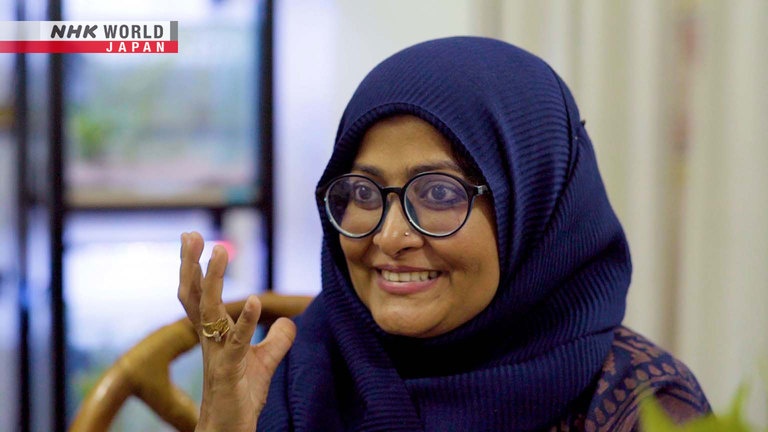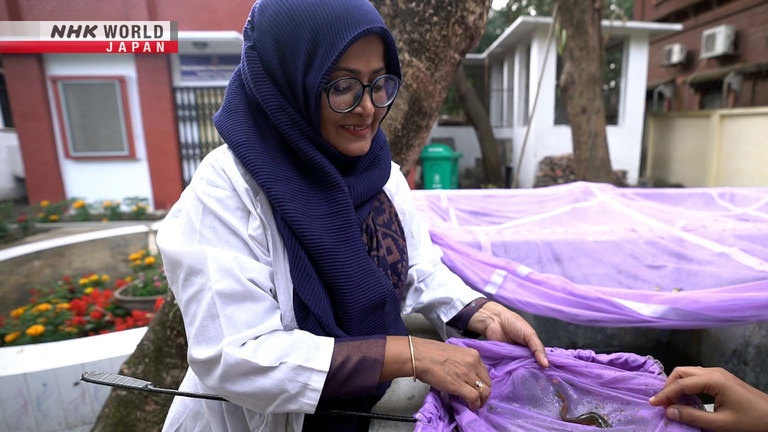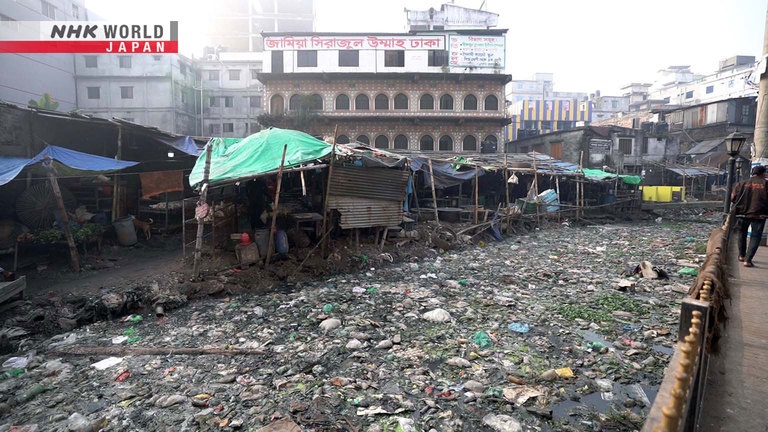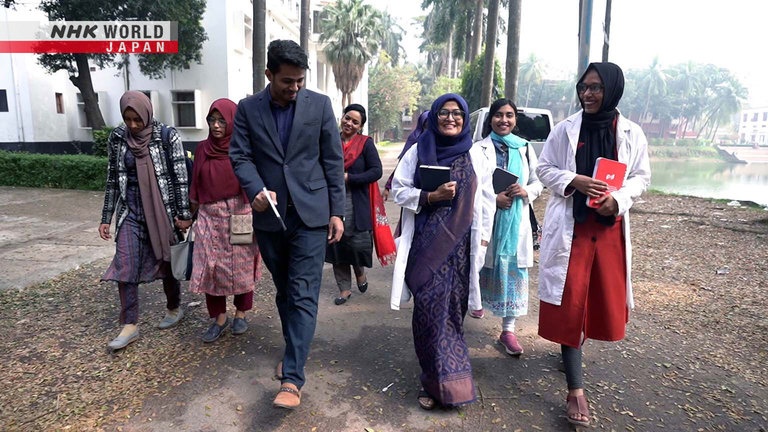A Winding Road From Zoology to Social Change: Gawsia Wahidunnessa Chowdhury / Professor of Zoology
Dr. Gawsia Wahidunnessa Chowdhury is a globally acclaimed zoologist who studies the effects of plastic pollution on aquatic life in Bangladesh. She talks about ways to effect social change.




Transcript
Direct Talk
Bangladesh has some of the
richest freshwater areas in the world
and is home to a diverse range of organisms.
However, environmental pollution has expanded
along with rapid economic development,
threatening the living environment
for humans and other lifeforms.
If our aquatic systems are not in good health,
we are actually not keeping well.
So this is like a reflection of
how we're surviving.
In this edition, we introduce the zoologist
Dr. Gawsia Wahidunnessa Chowdhury.
Gawsia Wahidunnessa Chowdhury
Professor of Zoology
She has long been researching
the effects of environmental pollution
on aquatic ecosystems.
In recognition of her achievements, she
received the OWSD-Elsevier Foundation Award
for up-and-coming female scientists.
And she was selected as one of the
"100 Asian Scientists" in 2023.
However, in South Asia, it has not been easy
for female researchers to achieve results.
Gawsia talks about ways
to effect social change
both as a researcher and as a woman.
A Winding Road From Zoology to Social Change
In Bangladesh, plastic waste
has developed into a serious social problem.
Plastic debris clogs the drains,
causing frequent flooding damage.
Over the past two decades, consumption of
plastics in urban areas has greatly increased.
What can I do?
I sell chickpeas with gravy.
I have to use polythene!
Paper bags would get wet.
Alternatives to polythene
are not easily available.
So we don't have any other choice
but polythene.
But many people feel threatened
by the growing environmental pollution.
You can see lots of polythene on the streets.
What can we do?
Morality is going down. Very down!
Behind the pollution is the belief
that the nation's rivers are as familiar
and forgiving as Bangladeshi mothers.
They consider the river as their own mother.
And one of them say,
"Oh, no, it will never harm the river.
I can throw anything.
Because I can do anything with my mother.
She will never get angry with me.
So rivers are like our mother.
So we can throw, we can throw everything.
It will clean. It will remain clean."
So it is a very complex situation.
We talk to the fishers.
They say these days
when they are collecting fish,
there are many plastic than the fish.
This is one of the threats.
So my vision, through research,
I want to ensure like a
healthy aquatic ecosystem.
The University of Dhaka is
Bangladesh's top educational institution.
This is Gawsia's base for
her research on aquatic life.
What she is currently focusing on
is the impact of microplastics
on aquatic life, such as fish.
We are trying to understand
what are the changes in their tissue level.
When they are ingested plastic,
they must be stop eating or
what are their behavioral changes.
The effects of plastics on aquatic life
can be classified into two main categories.
One effect is that aquatic life
suffocates, starves, or drowns
as a result of ingesting plastic products
such as plastic bags
or becoming entangled in
discarded plastic fishing nets.
The other is that plastic products
deteriorate and become tiny microplastics
that are taken up by living organisms
and so pass into the human body.
Their effect urgently needs more research.
This is especially important
research in Bangladesh,
which has more than 700 rivers.
It relies on fish for about 60% of
its annual animal protein intake.
In Bangladesh, we have about 253
freshwater fishes and about 400 marine species.
We are actually consuming the organisms.
Like we are every day we are consuming fish.
And we have fishes
contaminated with microplastics.
If our aquatic systems are not in good health,
we are actually not keeping well.
So this is like a reflection of
how we're surviving.
Gawsia was born in Dhaka in 1979.
Her father was a freedom fighter who devoted
himself to his country's independence.
Because of his influence,
ever since she can remember,
she was thinking that she would
like to help others in the future.
First of all, I was like
my vision was to serve people.
Because I'm the daughter
of a freedom fighter.
My father fought for this nation.
And now we have Bangladesh.
So I had a dream to serve Bangladesh.
So I wanted to be a doctor
at the beginning of my career.
And I thought like, this is the place
like better than a doctor,
because a doctor can
always deal with the patient,
but I can deal with the whole kingdom,
including human beings,
because it's like a threatened animal,
threatened habitat.
If I can contribute to
restore this habitat, I can...
I'm not only dealing with the human beings,
I'm dealing with the whole animal kingdom.
So I think is like a study in zoology
is impactful than being a doctor.
As she began her research career,
Gawsia was confronted with
Bangladesh's social structures
and customs that discriminated against women.
She found this in
the academic world and at home.
For male scientists, it is not that hard.
But for a female scientist,
we have to struggle.
We have to prove our ability.
Then things are smooth for us.
But we have to struggle a lot.
I was trying to get the facilities
for the research.
But whenever I visited any place,
they just say no to me.
They said no to me.
No, we don't have that facility.
So I was crying, sitting at the stair,
and I was very frustrated at that time.
And also, when I am going outside home,
we have to take permission from family.
It's a culture for here in Bangladesh.
For female students, considering the like,
their social, culture, everything
they have to convince their parents.
It is like a first initial like barrier.
Like we have to cross that barrier.
She still lives with
her mother, Shirajunnessa.
When she wanted to participate in fieldwork
as an undergraduate, Shirajunnessa said "No."
Many incidents happen in society.
I was afraid something could happen to her.
But Gawsia's father keenly supported her
and convinced her mother to say "Yes."
I do keep my father as my inspiration.
And for any situation,
in all situations in my life,
he actually taught us never give up.
Never give up your hopes.
One day, after patiently continuing her
research, an opportunity presented itself.
She was asked to participate in
a large-scale project.
It was an expedition to survey
all 2,575 kilometers of the Ganges
from the Himalayas down to the Bay of Bengal.
India and Bangladesh jointly
participated in the project,
and Gawsia was nominated
as the team leader for Bangladesh.
Like It was my dream-come-true project.
The Ganges is one of the most polluted,
second most polluted rivers in the world.
And if we consider
the ecosystem services of the Ganges
it's like connected: many people,
like millions of people, depend on it.
So people like with,
knowingly and unknowingly,
they throw their discarded, like they
discard their fishing nets here and there.
And ultimately it is like treated
as the ghost fishing nets.
So many species like they are
under threat due to these fishing nets.
So abandoned lost and
otherwise discarded fishing nets
is a very big threat for aquatic organisms.
So in this research, we have found
like in the Ganges River Basin,
there is 1 to 3 billion pieces of microplastic
releasing in the Bay of Bengal every day.
Over the course of a year and a half,
with a total of more than 15 researchers,
she clarified the entire picture of
plastic pollution in the Ganges.
The project was widely acclaimed
both at home and abroad,
and Gawsia was internationally recognized.
When I received the Award,
it was a global recognition.
And sometimes global recognition helps
us to make ourselves more visible
to the like the co-workers.
It actually helps me to prove
what women in science
and conservation can achieve
while given the responsibility.
Since now I am inspiring more researchers
to contribute for mitigation or
management of plastic waste of Bangladesh.
Gawsia clarified that
among the plastic pollutants
fishing nets are
a particular threat to aquatic life.
Various efforts, including her research,
are beginning to change
public awareness in Bangladesh.
If we throw our nets in the river,
fish will get stuck and die.
Eventually our luck will run out.
Gawsia is also actively involved in
environmental education for children,
trying to bring about small changes
in people's awareness and behavior.
In addition, in cooperation with
women in fishing villages,
she's working on a project
with the World Bank
to make recycled products
from discarded fishing nets.
Whenever we prepare a plan
or whatever we decide,
I think we have to have key people
involved in the process.
Because for banning plastic, we have to have
participation from every stakeholders,
like community, like users,
users from all level.
And also the producers.
Producers, users, and then
the policy makers, researchers.
Everyone should be there.
So if the plan is supporting views from all
the stakeholders, then it is a stronger plan.
Gawsia also involves
her students in the project,
wishing to foster promising scholars to-be.
So this is the first
ever study in Bangladesh.
And this, we are identifying
all the harmful findings.
The way she lives influences
many young female students.
She's a mother, she is the lecturer
of our university, our department.
So how she cares all the things and
also she is the researcher very renowned.
So I want to make myself like her.
I want to think about habitable
for the people coming after me,
for the future generations,
even if it's by a little bit.
And I want to be there for that
when Mam's working on that
because she's already been doing that.
So, what is Gawsia's motto?
In Bangladesh, we need
women friendly research environment
because women are the key change makers.
Now we are in a
critical condition, like globally,
all the aquatic systems are
facing different categories of threat.
And now, it's our responsibility
to take the charge.
There is a proverb:
"You gave me one educated mother,
I will give you an educated nation."
So if we involve more
women scientists doing research,
making decisions, then
there will be a sustainable change.